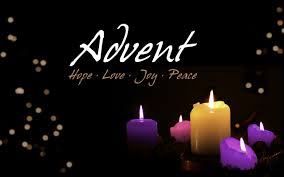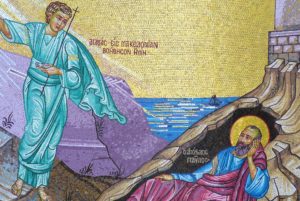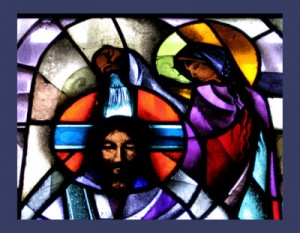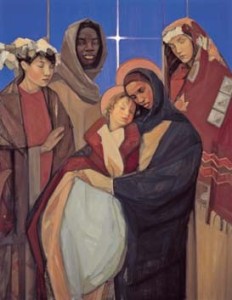Trinity Sunday Sermon: The Earth Is Full of God’s Glory
The Earth Is Full of God’s Glory (Isaiah 6:1-8; John 3:1-17: Trinity Sunday, Year B)
“In the year King Uzziah died,” Isaiah said, and those who were listening shuddered and looked at their feet instead of at him. It would be the equivalent of saying “In the year terrorists flew planes into the World Trade Center.” Or “In the year Covid-19 shut down the world.” The year King Uzziah died was not a good time for the country of Judah. The empire of Assyria was expanding its power through conquest. The end of Uzziah’s reign would be the last time Judah was an independent country in the middle of the empires of the Middle East and Egypt. The Syro-Ephraimitic War was just beginning. As a response to Assyria’s growing dominance, Syria and Israel had joined together to fight Assyria. When Judah refused to join them, they decided to attack Judah and make King Ahaz, Uzziah’s successor, join them one way or the other. So when Isaiah began his story of how he was called by God with “In the year King Uzziah died,” the people were not expecting a story with a happy ending.
Then Isaiah told where he was when he saw his vision of God: the Temple. And the people thought, “Oh that must be nice. To be one of the few people who can go into the Temple and be safe. How nice for him.”
Because here is what we modern-day Christians tend to forget: the Temple in Jerusalem was not like our churches. Not just anyone could get into the Temple itself: you had to be descended from Aaron. Only Aaron’s male descendants could be priests, and priests were the only ones allowed into the Temple itself. Women could go into the outer court, and men could go into the inner court, but only priests went into the temple. Isaiah was part of a very select group. The only reason he could pray in the Temple where God appeared to him was that he was born into the right family.
But God isn’t going to let Isaiah stay in the Temple. Although Isaiah had a vision of God’s robe filling the Temple, the seraphs who wait before the throne declare: “Holy, holy, holy is the LORD of hosts; the whole earth is full of his glory.” The WHOLE earth is full of God’s glory—not just the Temple or even the Temple Mount. The seraphs declare God is found in all of the world, and God wants someone to go into that world and tell the people God is with them wherever they are.
The Temple hierarchy is still firmly in place when Nicodemus visits Jesus one night in John 3. In fact, Jesus had just let the priests know what he thought of the way they controlled access to God in the previous chapter by throwing the merchants and money changers out of the Temple’s outer court. The only place women and Gentile proselytes could worship was also a noisy marketplace full of merchants selling animals to sacrifice and exchanging unclean pagan money for the Temple shekel. Jewish men could get away from the chaos in the inner court of the Temple, and of course, the priests could still go into the silent Temple, so the noise and hoopla from the outer court didn’t bother them in the least.
Jesus makes it clear to Nicodemus that God hasn’t changed her mind about being out and about in the world. The two have an interesting and befuddling theological conversation:
Jesus begins: “‘Very truly, I tell you, no one can see the kingdom of God without being born from above.’ Nicodemus said to him, ‘How can anyone be born after having grown old? Can one enter a second time into the mother’s womb and be born?’ Jesus answered, ‘Very truly, I tell you, no one can enter the kingdom of God without being born of water and Spirit. What is born of the flesh is flesh, and what is born of the Spirit is spirit. Do not be astonished that I said to you, “You must be born from above.” The wind blows where it chooses, and you hear the sound of it, but you do not know where it comes from or where it goes. So it is with everyone who is born of the Spirit.’ Nicodemus said to him, ‘How can these things be?’ Jesus answered him, ‘Are you a teacher of Israel, and yet you do not understand these things?’”
I don’t know if Nicodemus is actually confused by this conversation, or if he is being deliberately obtuse. Nicodemus is part of the Temple hierarchy: he benefits as a leader who has access to God and denies that same access to most of the Jewish people and all of the Gentile proselytes. But if Jesus is right–if there is another birth after the physical birth that gave Nicodemus the privileged access to God he has, and that birth of the Spirit grants equal access to God regardless of what tribe or family that one is born into–then who needs to the Temple? And who needs the Temple hierarchy to mediate between God and her people? If “the wind blows where it chooses, and you hear the sound of it, but you do not know where it comes from or where it goes. So it is with everyone who is born of the Spirit” is true, and this birth of the Spirit is as mysterious as the wind coming and going then how is the Temple hierarchy able to control access to the God of the heavens and the earth?
So when Nicodemus asks: “How can these things be?” he may not be asking about how being born from above by the Spirit is possible. He may be asking how can it be that everyone is able to have equal access to God.
So you may be wondering what all of this has to do with Trinity Sunday. Here’s the takeaway: it doesn’t matter which member of the Trinity we’re talking about: the Father or Mother, the Son, or the Holy Spirit: there is one thing the entire Godhead is agreed on: everyone on this planet has equal access to God the Father and Mother, God the Son, and God the Holy Spirit. The whole earth is full of God’s glory. The Spirit blows wherever she wants and makes whoever she wills a child of God, regardless of birth, family, race, nationality, religion, or creed. The family of the Trinity wants everyone to come into the fold, and the Godhead has always been actively working against all of the ways we humans come up with to limit access to God.
God appeared to Isaiah in the Temple because that was the only place Isaiah thought God would be and found out otherwise. Nicodemus comes to Jesus at night and discovers Jesus’ clearing out the Temple of salespeople was just the start of his radical idea that God was everywhere. And this is where my brain has been all week. Seeing the power structures in place in these Scripture Readings to keep most of the people away from God. Thanks to this last year I’ve been thinking A LOT about power structures anyway, as I’m sure most of us have. Both the pandemic and the Black Lives Matter movement have shown us the unequal access to health care, justice, and being able to walk down the street safely whole swaths of Americans have to live with. The last thing the church should be doing is upholding these power structures. Unfortunately, the opposite is true: the white church in the U. S. not only upholds these power structures, but we created them. Then we claimed they were God’s will just as Isaiah and Nicodemus thought it was God’s will to so severely limit access to God through the Temple hierarchy.
You’d think at some point God would just get tired of us stupid humans doing the same thing over and over and over again. Seriously, we’ve been creating power structures to limit access to God and to the resources God created for everyone to share in since the beginning. All the selfishness, greed, and power hoarding going on in this country isn’t new. Just ask the people of Judah after King Uzziah died. The human race has been acting this way for a very long time. And God just keeps coming to us and showing us there is another way to live. The WHOLE EARTH is still full of God’s glory. God the Creator is still creating and re-creating the world. God the Son is still teaching the world what it looks like to live the way God wants us to live. God the Holy Spirit is still blowing through the world making us children of God with unlimited access to the Holy and Undivided Trinity. The Trinity never gives up on us. So we can’t give up on ourselves either.
I’m proud of the work Grace has done to address our own prejudices and the way we are complicit in these power structures. I’m proud we want to repent of these sins, and we want to do things that will start taking down these structures. As we do this work of making the South Loop and Chicago a more equitable place for everyone, we need to remember that the Holy Trinity has already gone before us. The Godhead has been at work in this city for a very long time challenging these power structures, and leading churches across the city to address different aspects of the power structures that try to hoard as much as possible for the fewest people possible.
As we enter Ordinary Time—the time the church is called to take Christ out into the world–we need to remember Christ is already in the world working. The Holy Spirit is still blowing through the world. And the Creator is still fine-tuning her creation. We just need to pay attention. Pay attention to where the Trinity is already at work. Then join the Creator, the Son, and the Holy Spirit in the continuing work of redeeming the entire world for God because the whole earth is full of God’s glory.





